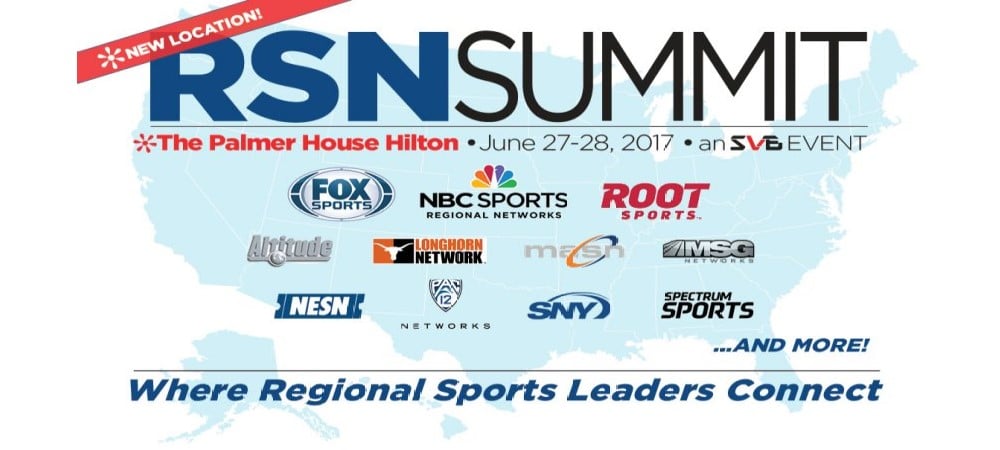- Eight states currently have active sportsbooks and six states have recently signed legal sports betting into law.
- NBC Sports Washington was the first to provide a sperate telecast of a professional sports matchup while simultaneously presenting sports betting focused content.
- The SVG RSN Summit is an annual event where individuals from across the country working in the regional sports network industry come together to discuss new trends.
DENVER – US sports betting is an industry that is constantly growing and the number of sports bettors in the country is only growing by the day. That is why speakers at the 2019 SVG RSN Summit in Denver had no choice but to discuss how to implement the activity into their constantly evolving regional sports networks.
“Sports betting has moved from taboo to mainstream,” said Shawn Oleksiak, VP/EP, live events, of NBC Sports Philadelphia. “It’s here, it’s not going away, and it’s big money.”
Pennsylvania is just one of eight states which currently has active legal sports betting of some type. There have also been six states that also legalized the activity earlier this year.
New York, who voted to allow sports betting in upstate commercial and tribal casinos in 2013, also launched sportsbooks earlier this week.
Questions surrounding the sports betting industry and how it will affect regional sports networks across the country were answered during one of several panels at the 2019 SVG RSN Summit.
Oleksiak spoke on how his Philadelphia network was able to tailor 76ers games to local sports bettors. Beginning in March, telecasts of 76ers games could be presented with sports betting content on screen as the game was being played out in real-time.
“We also had sperate talent, and for the entire game, added graphics like the over/under, the spread, and others during each quarter,” said Oleksiak.
NBC Sports Washington tried a similar approach back in January during a Washington Wizards game. Those who tuned in to NBC Sports Washington Plus had sports betting type questions presented on screen and whoever predicted the most correctly was able to win a prize.
The format was presented in a way that made it easier for those new to sports betting to be able to understand.
Finding the balance of attracting newcomers while engaging experienced sports bettors was another issue discussed on the panel by Steve Byrd, head of global strategic partnerships for Sportradar.
“You need to make the programming as broad as possible and have to be on top of everything for pros, as they will catch you if you get something wrong,” said Byrd. “You have to be on your game but also broadly appealing for those who are just starting.”
An example that Byrd gave MLB betting odds. While the seasoned sports bettor may understand what it means for a team to be favored at -110, others may not.
“MLB needs bet types that will be easier for people to get their heads around,” said Byrd. “You want fan engagement to direct dollars to the bookmakers. How do we make it easier and more fun to bet on baseball? Plus/minus is not intuitive.”
Sportradar is a global leader in sports data intelligence and recently announced a partnership with the MLB back in February. Data was another big topic on the minds of panel speakers as this is the key to providing live betting odds.
“The biggest revenue is still on live odds, and in-play betting is the highest volume of bets,” said Byrd.
Regional sports networks finding a way to display live odds while keeping average sports bettors and pros engaged seems to be the future of the industry. As more states legalize sports betting, more networks may be looking to leverage the activity to bolster their ratings.
Advertising Disclosure
In order to provide you with the best independent sports betting news and content LegalSportsBetting.com may receive a commission from partners when you make a purchase through a link on our site.
News tags: 2019 SVG RSN Summit | Denver | MLB | NBC Sports | New York | Pennsylvania | Philadelphia | Philadelphia 76ers | Shawn Oleksiak | Sportradar | Steve Byrd | Washington Wizards

– In his career, Hasan has worked both local and state government positions—including the Attorney General’s Office in Florida. On top of being familiar with the legislative process, he has also been researching and writing on the legality of sports betting across the US. Outside of work you’ll most likely find him producing or playing music, playing sports, or working on creative writing projects. You’ll also catch him at Doak Campbell Stadium cheering on the Noles.


 Bitcoin Sports Betting Sites
Bitcoin Sports Betting Sites Best Online Sports Betting
Best Online Sports Betting Famous Sports Bettors
Famous Sports Bettors States With Legal Sports Betting
States With Legal Sports Betting Sports Betting Events
Sports Betting Events




